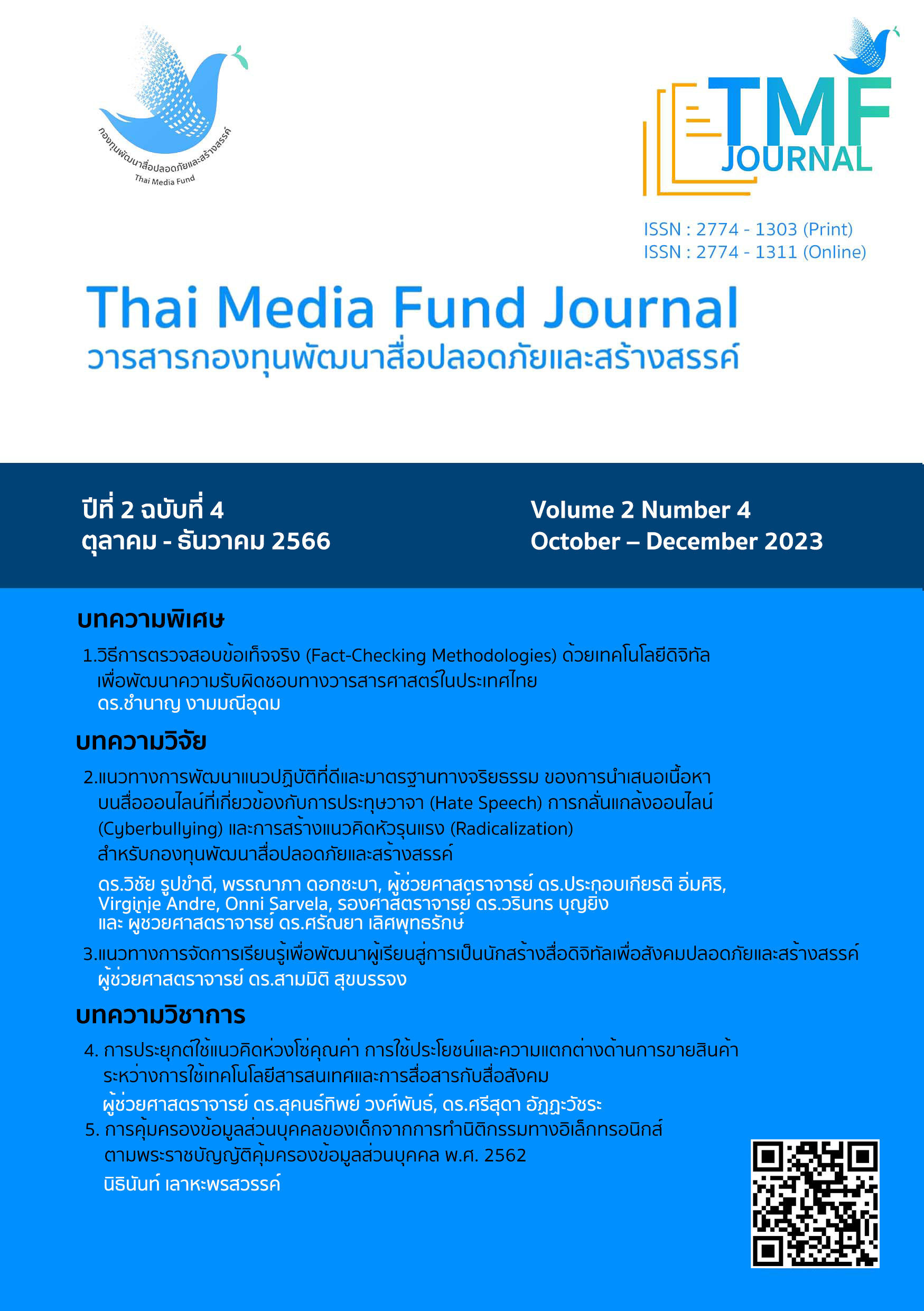การคุ้มครองข้อมูลส่วนบุคคลของเด็กจากการทำนิติกรรมทางอิเล็กทรอนิกส์ ตามพระราชบัญญัติคุ้มครองข้อมูลส่วนบุคคล พ.ศ. 2562
Main Article Content
บทคัดย่อ
การศึกษานี้ต้องการนำเสนอเรื่องการคุ้มครองข้อมูลส่วนบุคคลของเด็กและเยาวชน พิจารณาจากพระราชบัญญัติคุ้มครองข้อมูลส่วนบุคคล พ.ศ. 2562 ในเรื่องการให้ความยินยอมของผู้เยาว์ที่มีการนำเรื่องความสามารถในการทำนิติกรรมของผู้เยาว์ตามประมวลกฎหมายแพ่งและพาณิชย์ วิเคราะห์ในบริบทของสังคมดิจิทัลปัจจุบันที่สื่ออิเล็กทรอนิกส์มีบทบาทอย่างมากต่อพฤติกรรมและ การตัดสินใจของเด็ก ที่จะให้ความยินยอมในการเก็บรวบรวม ใช้ หรือเปิดเผยข้อมูลส่วนบุคคลของตน และพฤติกรรมของผู้ปกครองที่อาจเป็นผู้เปิดเผยข้อมูลส่วนบุคคลของเด็กเองโดยไม่ได้มีเจตนาสร้างความเสียหาย แต่อาจเป็นเพราะความไม่ตระหนักรู้ถึงความสำคัญของข้อมูลส่วนบุคคลอย่างเพียงพอ จึงทำให้การส่งต่อ หรือเผยแพร่ข้อมูลของเด็กบนสังคมออนไลน์จะนำมาซึ่งภัยคุกคาม
แก่เด็กได้การสร้างความตระหนักรู้ในเรื่องข้อมูลส่วนบุคคลเด็กจึงมีความสำคัญ ทั้งในการให้ความรู้แก่เด็กเอง รวมถึงผู้ปกครองและครู เพื่อให้เกิดประสิทธิผลสูงสุดในการคุ้มครองข้อมูลของเด็กและเยาวชน
Article Details

อนุญาตภายใต้เงื่อนไข Creative Commons Attribution-NonCommercial-NoDerivatives 4.0 International License.
เอกสารอ้างอิง
Adawiah, L. R., & Rachmawati, Y. (2021). Parenting program to protect children’s privacy: The phenomenon of sharenting children on social media. Jurnal Prmdidika Usia Dini, 15(1), 162-180.
Birch, K., Cochrane, DT., & Ward, C. (2021). Data as asset? The measurement, governance and valuation of digital personal data by Big Tech. Big Data & Society, January-June, 1-15.
EU. (2019). Regulation (EU) 2016/679 of the European parliament and of the Council of 27 April 2019 on the protection of natural persons with regard to the processing of personal data and on the free movement of such data, and repealing directive 95/46/EC (General Data Protection Regulation). EU.
Hof, S. V. D., & Lievens, E. (2018). The importance of privacy by design and data protection impact assessments in strengthening protection of children’s personal data under the GDPR. Communications Law, 23(1).
Iskul, A. M. (2021). Child right to privacy and social media – personal information oversharing parents. Baltic Journal of Law & Politics, 14(2), 101-122.
Lievens, E., Livingstone, S., McLaughin, S., O’Neill, B., & Verdoodt, V. (2018). Children’s rights and digital technologies. In International Human Rights of Children, International Human Rights (pp. 487-513). Singapore: Springer.
Livingstone, S., Stoilova, M., & Nandagiri, R. (2019). Children’s data and privacy online: Growing up in a digital age, An evidence review. London: London School of Economics and Political Science.
Michail, S., Grace, R., Ng, J., & Shier, H. (2023). Cultivating child and youth decision-making: The principles and practices of the respect approach to professional development. Children & Society, 1-20.
Personal Data Protection Act BE 2019. (2019). Royal Gazette. Volume 136, Section 69. Pages 52-95.
Putra, W. H. A. (2023). Negotiating students’ social media and personal data practices in school: From problematization to mobilization. Sweden: University of Gothenburg.
Rodgers, N. S. (2020). Understanding personal data in the world of social media. Utah: Utah State University.
Romansky, R. P., & Noninska, I. S. (2020). Challenges of the digital age for privacy and personal data protection. Mathematical Biosciences and Engineering, 17(5), 5288-5303.
Smith, K. E., & Pollak, S. D. (2022). Children’s Value-based Decision Making. Scientific Reports, 12(5993), 1-8.
Thamangraksat, S. (2019). Protection of children’s privacy on electronic media. Kasem Bundit Journal, 20(1), 131-145.


